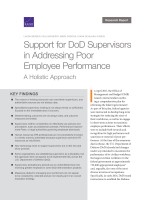| 来源类型 | Research Reports
|
| 规范类型 | 报告
|
| DOI | https://doi.org/10.7249/RR2665
|
| 来源ID | RR-2665-OSD
|
| Support for DoD Supervisors in Addressing Poor Employee Performance: A Holistic Approach |
| Laura Werber; Paul W. Mayberry; Mark Doboga; Diana Gehlhaus Carew
|
| 发表日期 | 2018
|
| 出版年 | 2018
|
| 页码 | 32
|
| 语种 | 英语
|
| 结论 |
Develop supervisors- The volume of training resources can overwhelm supervisors, and authoritative sources are not always clear.
- Specialized supervisory training is not always timely or sufficiently focused on the immediate concern.
- Desired training outcomes are not always clear, and outcome measures are limited.
Support supervisors- Supervisors neither consistently nor effectively use policies and procedures, such as probationary periods, Performance Improvement Plans, and legal authorities governing employee dismissals.
- Human resources (HR) professionals are not consistently involved in a timely manner, potentially because supervisors perceive HR resources as insufficient.
- New technology tools to support supervisors are on the rise and show promise.
Professionalize supervisors- Some organizations are establishing supervision as a discipline, but this approach does not appear to be implemented fully across DoD.
- Supervisory probationary periods are an underutilized tool now receiving greater emphasis in some DoD demonstration projects.
Implement institutional monitoring and evaluation- Measures related to managing poor performers do not appear to be consistently collected and are not clearly part of an overall strategy.
- Decentralized tracking and evaluation make it difficult for leadership to accomplish its implementation and monitoring or identify organizational trends.
Enact institutional communications and transparency- Many supervisors perceive organizational culture and their leaders as obstacles to removing poor performers.
- Employees tend to have negative views about how organizations handle poor performers, in part because actions are viewed as sensitive and are not communicated to respect individual rights.
- Some organizations share outcomes widely at long intervals or a high level of aggregation (strategies to protect individual privacy).
|
| 摘要 |
- Ensure vital performance management principles, such as frequent, regular feedback, are executed.
- Review and institutionalize performance management policy guidance to improve its comprehension and usage.
- Develop policy on desired objectives and outcomes for a Manager Support Board.
- Empower supervisors and HR professionals to make the best use of the full range of support mechanisms available to handle poor performers.
- Extend and fully implement the requirement to include supervision-related performance elements in performance plans on par with technical elements.
- Assess and communicate both processes and outcomes related to performance actions.
- Collect and share best practices in managing poor performers.
|
| 主题 | Civilian Military Workforce
; Performance Measurement
; United States Department of Defense
; Workforce Management
|
| URL | https://www.rand.org/pubs/research_reports/RR2665.html
|
| 来源智库 | RAND Corporation (United States)
|
| 引用统计 |
|
| 资源类型 | 智库出版物
|
| 条目标识符 | http://119.78.100.153/handle/2XGU8XDN/108916
|
推荐引用方式
GB/T 7714 |
Laura Werber,Paul W. Mayberry,Mark Doboga,et al. Support for DoD Supervisors in Addressing Poor Employee Performance: A Holistic Approach. 2018.
|
|
文件名:
|
x1543953103547.jpg
|
|
格式:
|
JPEG
|

|
文件名:
|
RAND_RR2665.pdf
|
|
格式:
|
Adobe PDF
|
除非特别说明,本系统中所有内容都受版权保护,并保留所有权利。